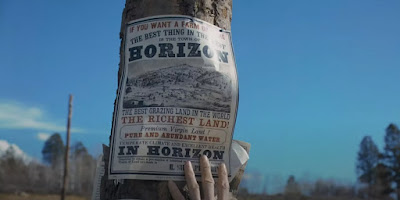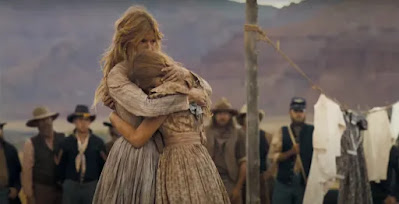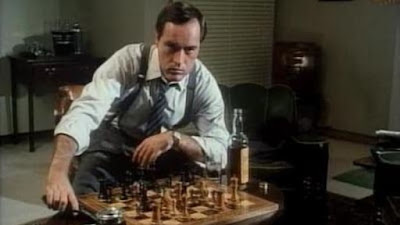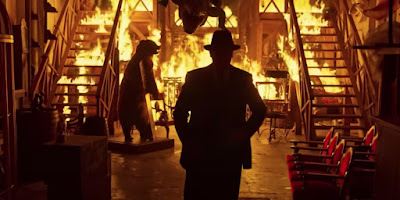Friday, August 8, 2025
The Naked Gun (2025)
Friday, July 5, 2024
Horizon: An American Saga - Chapter 1
Friday, June 7, 2024
The Dead Don't Hurt
And in this structure, the film feels more like a memory, a totem of the woman we see dying in the beginning. Despite her early demise in the film, we see her life unfold in the flashbacks, the decisions she makes, the things she endures. It's really her film and the character haunts it—like we're seeing it play out in the moment of her death. And the performance of Krieps is a wonder to behold, played out with restraint, choosing her battles, internalized, not being dramatic about it. Enduring. It's a cliché to say that it's an award-winning performance—it has to be recognized first, and to do that, people have to see it, and I doubt the movie will get the attention it deserves to garner her such acclaim.Which is a pity. This is already one of my favorite movies of the year (it clicks so many of my "this-makes-a-good-movie" boxes, which run counter to the adrenaline-fueled roller-coasters that drive the weekend box office figures), and I wish people will go out to theaters to see it. It's a big screen movie—especially with the sound—and it will lose a lot on a small video screen, and—god forbid!—on a telephone. It's an appointment movie, where time needs to stop to appreciate it and take it in. But, we live in a different time and a different sensibility than the one portrayed.More's the pity. But, the mysteries of The Dead Don't Hurt are still percolating through my mind, and it may take another visit to fully appreciate just how good it is.
Saturday, February 18, 2023
Marlowe (2022)
A Tarantula on an Angel Food Cake
Wednesday, November 17, 2021
X-Men Origins: Wolverine
Noooooooo! Written at the time of the film's release....
 "C'mere, Kid. Got a lousy movie to show ya!"
"C'mere, Kid. Got a lousy movie to show ya!" * If you ever want to see it done to death, check out Danny DeVito's direction of Hoffa.
** A word of explanation from 2021: This refers to "The Daily Show" when Jon Stewart was hosting it...he'd make frequent use of an overhead shot (in moments of duress) and scream to the heavens "Noooooooooooooo!" Often they'd put a reverberating echo on it (That's how it SHOULD be done!)
*** Spoiler Alert: Good place to put spoilers, isn't it? In case you think you're missing something, you're not. There's a cameo by Professor X (Patrick Stewart reprising his role), although why is Scott (Cyclops) the only guy X was reaching out to?—seems he could have contacted all the escaping mutants (because it would have killed the suspense is why), and the by-now standard "Marvel Tag" at the end of the credits is no big deal—Wolverine at a bar: "Drinking to forget?" "No. Drinking to remember." Supposedly, there are three others. If they're all that "good," don't bother collecting them all.
Wednesday, June 23, 2021
Robin Hood (2010)
I mentioned Ridley Scott's version of the "Robin Hood" story last week (which started as a screenplay called "Nottingham"). Here is a review of the resulting film, written at the time of its release.
Every fifteen years or so, there must be a big budget remake of the "Robin Hood" legend—that's a bit less than the turnaround cycle for The Compleate Works of Jane Austen. The last time the fletches flew on the big screen there were two competing Hoods—the flashy Kevin Reynolds/Kevin Costner version and one starring Patrick Bergin. Before them was Robin and Marian, various series, and The Adventures of Robin Hood, the Warner Bros. classic with Errol Flynn, which was itself a remake of silent versions. Then, there have been satiric vignettes in Shrek and Time Bandits,* Mel Brooks
has done a movie (Men in Tights) AND a series ("When Things Were Rotten")—Mel loves his Public Domain. Disney has touched on it a couple times as well, including an animated funny animals version. The character and his ancillary co-stars have a long oral tradition with many variations of "The Hode," so it's natural that someone drums him up for another "Have at ye" every few years, each reflecting the times in which they were made. Robin has been yeoman and nobleman, Crusader and thief, trickster and military man, young and old. Although we've been down this well-trod pathe in the glenne before, it was interesting to think about what the Gladiator team of Ridley Scott and Russell Crowe could do with the story, and how they would approach it. And the answer is: with a little bit of everything. Scott with the help of scenarist Brian Helgeland** has a Robin Hood, an orphan Saxon Crusading with Richard the Lionheart (Danny Huston-he's great in this), who's an expert bowman and strategist by day, and a grifter by night. At the end of the Crusades, he is given a task, the complications of which lead him to Nottingham and the masquerade of being Robert Loxley, slain son of Sir Walter Loxley (Max von Sydow) and spouse of Lady Marian Loxley (Cate Blanchett)—this Robin is both commoner and gentry. The Sheriff of Nottingham (Matthew McFadyen) is not given much to do this time 'round, instead the intrigues are by Sir Godfrey (Mark Strong) and King Phillip of France, who plot to undermine the already shaky reign of the new King John (Oscar Isaac), the last son of King Henry and Eleanor of Aquitaine (Eileen Atkins), and invade England. The general structure of Robin Hood is superficially similar to “Gladiator” with big battles at both ends, and Scott uses the same stutter-shutter technique to give some verve to the action scenes. But there it ends. Crowe is considerably lighter as Robin Hood, though he does summon up genuine moments of drama. Performances are fine all around with Cate Blanchett and William Hurt (as William Marshall, the first Earl of Pembroke) being stand-outs. But the best performance is by Max von Sydow as the elderly Sir Walter. Blind, but nobody’s fool, Sir Walter takes the news of his son’s death with grim determination and courtesy for its messenger, and comes up with the Robin-as-Loxley ruse to protect Marion from having their land confiscated should he die. Von Sydow has been ill-used of late, playing teutonic villains of similar coldness, but this role shows him at full thespian power, and it would be robbery if he was not nominated for an Oscar for this performance. The film boasts good values all around, with Scott’s keen eye for cinematography and detail, the writing is clever and often ingenious (I think the fact that it's another Robin Hood movie sours a lot of people's expectations). The film never drags and offers considerable entertainment value. Only at the end does it falter, with a beach battle that seems overly-stretched in terms of production value and credibility. Either there was not enough planning or extras, but it looks to be constructed to not show something as opposed to creating an epic battle. Too much is made of the presence of landing craft as obstacles, and of one particular participant in the clamor, which seems to be done for scoring political points rather than good story-telling.But that is twenty minutes out of 140. For the most part, this new Robin Hood hits its mark. Yes, it might be superfluous (we can say this—with a straight face—with so many sequels headed our way?), but what's there on the screen is an interesting "take" on the legend that has lasted so long.
* John Cleese's immaculate nobleman with a "Bonny Prince Charlie" manner is one of my favorites.
** The original script, by the team of Ethan Rieff and Cyrus Voris, called "Nottingham," was more radical, but interesting in a concept-twist kind of way, but once Ridley Scott came on board, the concept changed.





















































